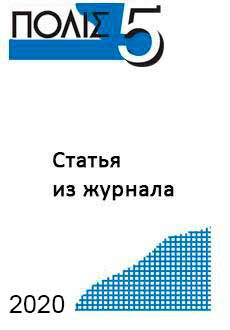Online shop of "Polis. Political Studies" Journal
We in the world, the world in us
Bugrov K.D., Loginov A.V. Back to Subject: The Theory of Just War in Contemporary Political Thought. – Polis. Political Studies. 2020. No. 5. P. 114-129. (In Russ.).
Free!
war, legitimacy, sovereignty, human rights, ideology, J. Habermas, M. Waltzer, K. Schmitt, V. Lenin.
The article compares several intellectual paradigms that inform the problem of just war. The beginning of article shows that the present-day legalist theory of permissible war (like Conventions and Charters of the UN), to our mind, inherits an antinomy which emerged in the history of political thought, and which counterposes state sovereignty and human rights. Within such normative framework, the justification of war gravitates either to protection of state sovereignty or to the defense of human rights; for example, the priority of human rights over sovereignty is being proclaimed by authors such as Habermas who reduce war to a mere ‘police operation’. We reconstruct the philosophical foundations of this theory (Vattel, Kant) to suggest that such a normative theory incurs the loss of state legitimacy as a criterion jus ad bellum, interpreting legitimacy on contractual terms. Further, we examine ideas of political realism (Morgenthau) and the critics of ‘Kantian-Wilsonian system’, which, as certain authors consider (Schmitt), leads towards the demonization of an enemy, towards the endless escalation of violence, and towards the transformation of regular war into partisan war. The third part of the article deals with the legitimation of war in Bolshevik political philosophy and studies the specifics of arguments of Lenin, which, along with the works of Pashukanis, represent the nucleus of the unique concept of just war, which goes beyond the antinomy ‘sovereignty – rights’. In the final chapter, the authors show that Walzer’s theory of just war, which is popular nowadays, shares certain characteristics with Leninist theory of war; for both these theories, firstly, both place importance in rhetoric strategies for problematizing the status of subjects waging war; secondly, both are sensitive to status-based justifications of war in particular cases; and thirdly, both place emphasis upon the necessity of effective persuasion of ‘ordinary people’ (or ‘masses’, in Lenin’s words) in the just character of war. The authors conclude that it is attention to the subject waging war and the subject consuming the information (an “ordinary person”) that makes a difference between these theories from the ‘Kantian-Wilsonain system’, from the strict legalist paradigm, and, finally, from the political realism of Morgenthau and Schmitt which operates through the concept of depersonalized state interest.
 English
English Русский
Русский

Reviews
There are no reviews yet.